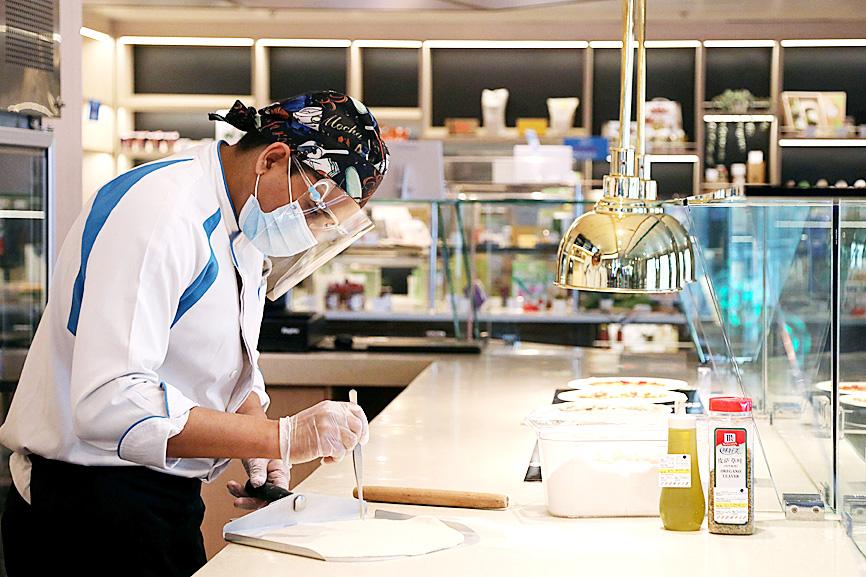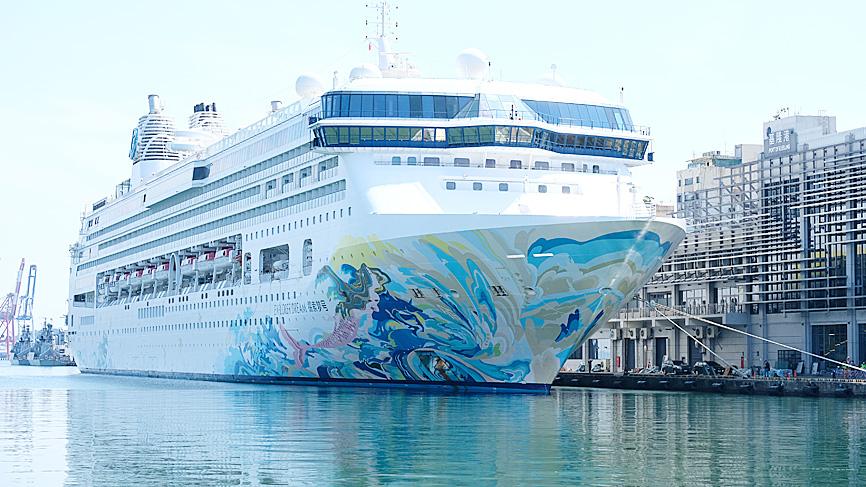The Explorer Dream (探索夢號) cruise ship yesterday set sail from Keelung Port on a four-day trip to Penghu and Kinmen in a first for the cruise industry in Asia since the COVID-19 pandemic began, and only the second such excursion worldwide.
A German vessel, the TUI’s Mein Schiff 2, set sail from Hamburg late on Friday night on a three-night North Sea cruise, beating Taiwan to the industry bragging rights.
Minister of Transportation and Communications Lin Chia-lung (林佳龍) and Minister of Health and Welfare Chen Shih-chung (陳時中) attended a news conference in Keelung to launch the Explorer Dream’s voyage.

Photo: Ann Wang, Reuters
Chen, who also heads the nation’s Central Epidemic Command Center (CECC), said that while people want to travel abroad, easing the nation’s travel restrictions must be done cautiously and “step by step.”
The quarantine measures taken to prepare for the ship’s departure were of an extremely high standard, with 50 of the more than 500 crew members quarantined on the ship and tested for COVID-19 on the seventh and 14th days of their quarantine, while the rest were quarantined ashore, Chen told reporters.
Those in the second group all tested negative for COVID-19 on the 14th day, and then practiced self-health management for another seven days after boarding the ship, he said.

Photo: Lin Hsin-han, Taipei Times
CECC officials had boarded the ship over the past few days to ensure proper disease prevention measures were being taken, he said.
A mask should be worn if social distance cannot be maintained, he said, adding that if a passenger shows symptoms, they would be placed in isolation, and once the ship docks, they would disembark and be quarantined immediately.
Island-hopping cruises would offer the public a travel experience similar to going abroad, and an opportunity to appreciate the beauty of Taiwan from the sea, Chen said, adding that every Taiwanese should do so once in their life.
The island-hopping cruise — operated by Genting Hong Kong Ltd’s (雲頂香港) Dream Cruises — was made possible with the efforts of many people, and was an important “first” sail, Lin said, adding: “The whole world is watching.”
The ship is carrying 1,200 passengers, compared with its normal capacity of 3,630, and would stop in Penghu and Matsu before returning to Keelung on Wednesday.
The Mein Schiff 2 faced similar restrictions, with occupancy limited to 60 percent, but reports said the ship sailed with 1,200 passengers compared with its 2,900 capacity.
It headed toward Norway, but passengers were to spend the weekend at sea with no land stops before returning to Hamburg.
Dream Cruises said it would offer 30 island-hopping trips over the next three months, taking passengers to Hualien and Kinmen County on four to five-day trips, each limited to no more than 1,815 passengers.
Meanwhile, industry sources said international cruise lines are vying for a piece of the domestic market, with Costa Cruises reportedly interested in an island-hopping itinerary with its Costa Serena.
However, the Maritime and Port Bureau yesterday said Costa Cruises has not filed a formal request.
A Ministry of Transportation and Communications official said that the government would wait for the Explorer Dream’s voyage to be completed, and everything to go smoothly, before allowing a second cruise ship to start offering trips.
If a shipboard COVID-19 outbreak were to occur, the burden on the nation’s medical resources would be significant, so Costa Cruises has been told that the earliest it would be able to operate a cruise would be early September, they said.
A travel industry source, speaking on condition of anonymity, said quarantine requirements mean that it might not be cost-effective for international cruise lines to offer island-hopping itineraries around Taiwan at this time.
The German cruise line AIDA is planning its first departure since the pandemic from Hamburg on Aug. 5, followed by a second on Aug. 12 from Rostock and a third on Aug. 16 from Kiel, Deutsche Presse-Agentur reported.
Additional reporting by AP and CNA

INVESTIGATION: The case is the latest instance of a DPP figure being implicated in an espionage network accused of allegedly leaking information to Chinese intelligence Democratic Progressive Party (DPP) member Ho Jen-chieh (何仁傑) was detained and held incommunicado yesterday on suspicion of spying for China during his tenure as assistant to then-minister of foreign affairs Joseph Wu (吳釗燮). The Taipei District Prosecutors’ Office said Ho was implicated during its investigation into alleged spying activities by former Presidential Office consultant Wu Shang-yu (吳尚雨). Prosecutors said there is reason to believe Ho breached the National Security Act (國家安全法) by leaking classified Ministry of Foreign Affairs information to Chinese intelligence. Following interrogation, prosecutors petitioned the Taipei District Court to detain Ho, citing concerns over potential collusion or tampering of evidence. The

‘FORM OF PROTEST’: The German Institute Taipei said it was ‘shocked’ to see Nazi symbolism used in connection with political aims as it condemned the incident Sung Chien-liang (宋建樑), who led efforts to recall Democratic Progressive Party (DPP) Legislator Lee Kun-cheng (李坤城), was released on bail of NT$80,000 yesterday amid an outcry over a Nazi armband he wore to questioning the night before. Sung arrived at the New Taipei City District Prosecutors’ Office for questioning in a recall petition forgery case on Tuesday night wearing a red armband bearing a swastika, carrying a copy of Adolf Hitler’s Mein Kampf and giving a Nazi salute. Sung left the building at 1:15am without the armband and apparently covering the book with a coat. This is a serious international scandal and Chinese

Seventy percent of middle and elementary schools now conduct English classes entirely in English, the Ministry of Education said, as it encourages schools nationwide to adopt this practice Minister of Education (MOE) Cheng Ying-yao (鄭英耀) is scheduled to present a report on the government’s bilingual education policy to the Legislative Yuan’s Education and Culture Committee today. The report would outline strategies aimed at expanding access to education, reducing regional disparities and improving talent cultivation. Implementation of bilingual education policies has varied across local governments, occasionally drawing public criticism. For example, some schools have required teachers of non-English subjects to pass English proficiency

TRADE: The premier pledged safeguards on ‘Made in Taiwan’ labeling, anti-dumping measures and stricter export controls to strengthen its position in trade talks Products labeled “made in Taiwan” must be genuinely made in Taiwan, Premier Cho Jung-tai (卓榮泰) said yesterday, vowing to enforce strict safeguards against “origin laundering” and initiate anti-dumping investigations to prevent China dumping its products in Taiwan. Cho made the remarks in a discussion session with representatives from industries in Kaohsiung. In response to the US government’s recent announcement of “reciprocal” tariffs on its trading partners, President William Lai (賴清德) and Cho last week began a series of consultations with industry leaders nationwide to gather feedback and address concerns. Taiwanese and US officials held a videoconference on Friday evening to discuss the